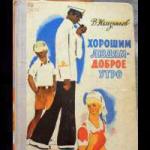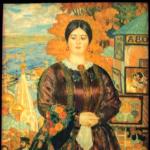Mikhail Glinka's romance "I Remember a Wonderful Moment" based on the poems of Alexander Sergeevich Pushkin is one of the most famous romances. The history of this romance began in 1819, when at one of the evenings in the house of Alexei Olenin, president of the Academy of Arts, Pushkin saw his nineteen-year-old niece Anna Kern. At dinner, Pushkin relentlessly watched Anna and did not spare praise for her. He was captivated by her beauty.
And soon he will write:
"I remember a wonderful moment:
You appeared before me,
Like a fleeting vision
Like a genius of pure beauty."
Perhaps the impression that the young beauty made on the poet turned out to be so unusual also because Pushkin had heard a lot about Kern’s unhappy marriage. The main culprit in this marriage was her father. She was seventeen years old when she attracted the attention of division general Ermolai Kern. The general was more than thirty years older than her.
Anna Petrovna Kern
Anna was a romantic girl who grew up reading French novels. She was not only beautiful, but was distinguished by her independence and originality of judgment. Of course, there was no way she could have liked the general. Many people had already wooed her, but her parents preferred the brave general. Anna was convinced that she would fall in love when she became the general’s wife, and she agreed due to her youth. A year later, her daughter Katya was born.
As the years passed, Anna Kern blossomed in all her feminine glory. She was an enthusiastic fan of Pushkin's poems. Anna never fell in love with her husband, the general, and over time, the break in her relationship with Kern became inevitable. It so happened that in the summer of 1825 Anna Kern came to visit Aunt Praskovya Osipova in Trigorskoye. At this very time, Pushkin was serving exile in the village of Mikhailovskoye, which was located next door. She was waiting for Pushkin's arrival from day to day and he arrived...


Anna Kern subsequently described this event as follows: “We were sitting at dinner when suddenly Pushkin came in. Aunt introduced him to me, he bowed low, but
didn’t say a word, timidity was visible in his movements. He was very uneven in his manner: sometimes noisily cheerful, sometimes sad, sometimes timid, sometimes daring - and it was impossible to guess in what mood he would be in a minute. When he decided to be amiable, then nothing could compare with the brilliance, sharpness and excitement of his speech.
One day he came to Trigorskoye with a large book. Everyone sat down around him and he began to read the poem "Gypsies." For the first time we heard this poem, and I will never forget the delight that gripped my soul. I was in rapture both about the flowing verses of this wonderful poem, and from his reading, in which there was so much musicality - he had a melodious, melodic voice. ..A few days later, my aunt suggested everyone take a walk to Mikhailovskoye after dinner.
Having arrived in Mikhailovskoye, we did not enter the house, but went straight into an old, neglected garden, with long alleys of trees, where I constantly stumbled, and my companion shuddered... The next day I had to go to Riga. He came in the morning and At parting, he brought me a copy of Onegin’s chapter. Between the pages I found a sheet of paper folded into four with the verses: “I remember a wonderful moment.” When I was going to hide this poetic gift in the box, he looked at me for a long time, then he frantically snatched it and did not want to return it, I forcibly begged for them again, what flashed through his head then, I don’t know...”
In its modern version, Glinka’s romance appeared nine years later in 1839 and was dedicated to Anna Kern’s daughter, Catherine. In the music of the romance there is the tenderness and passion of the blossoming of love, the bitterness of separation and loneliness, the delight of new hope. In one romance, in a few lines, the whole love story. Fate would have it that the composer, whose marriage was unsuccessful, would love his daughter with the same strong love as the poet loved his mother, Anna Kern.
At the beginning of 1839, he first saw Anna Petrovna’s daughter Ekaterina at the Smolny Institute, where she was studying at that time. Glinka recalled: “My gaze involuntarily focused on her: her clear, expressive eyes, unusually slender figure and a special kind of charm and dignity, spilled throughout her entire person, attracted me more and more.”
Catherine knew music perfectly, revealed a subtle, deep nature, and soon his feelings were shared by her. Anna Kern by that time had married a minor official who was twenty years younger than her and was quite happy. Her favorite saying was: “The course of our life is only a boring and dull period if you do not breathe in it the sweet air of love.”
Glinka dreamed of going abroad with Catherine, but his plans were not destined to come true. Catherine fell ill. Doctors suspected consumption, advised them to live in the village, and Anna Kern and her daughter went to her parents’ estate Lubny, and Glinka to her family estate Novospasskoye. So they separated forever...
But two great men, Pushkin and Glinka, erected a “monument not made by hands” to two beautiful women: Anna Kern and her daughter, Ekaterina Kern, a monument for all times in honor of the “wonderful moment of love” - a message to all who love in eternity.
The poem “K***”, which is more often called “I remember a wonderful moment...” after the first line, A.S. Pushkin wrote in 1825, when he met Anna Kern for the second time in his life. They first saw each other in 1819 with mutual friends in St. Petersburg. Anna Petrovna charmed the poet. He tried to attract her attention, but he had little success - at that time he had only graduated from the lyceum two years ago and was little known. Six years later, having again seen the woman who once so impressed him, the poet creates an immortal work and dedicates it to her. Anna Kern wrote in her memoirs that on the day before her departure from the Trigorskoye estate, where she was visiting a relative, Pushkin gave her the manuscript. In it she found a piece of paper with poems. Suddenly the poet took the piece of paper, and it took her a lot of persuasion to return the poems back. Later she gave the autograph to Delvig, who in 1827 published the work in the collection “Northern Flowers”. The text of the verse, written in iambic tetrameter, thanks to the predominance of sonorant consonants, acquires a smooth sound and a melancholic mood.
TO ***
I remember a wonderful moment:
You appeared before me,
Like a fleeting vision
Like a genius of pure beauty.
In the languor of hopeless sadness,
In the worries of noisy bustle,
A gentle voice sounded to me for a long time
And I dreamed of cute features.
Years passed. The storm is a rebellious gust
Dispelled old dreams
And I forgot your gentle voice,
Your heavenly features.
In the wilderness, in the darkness of imprisonment
My days passed quietly
Without a deity, without inspiration,
No tears, no life, no love.
The soul has awakened:
And then you appeared again,
Like a fleeting vision
Like a genius of pure beauty.
K Kern*
I remember a wonderful moment:
You appeared before me,
Like a fleeting vision
Like a genius of pure beauty.
In the languor of hopeless sadness,
In the worries of noisy bustle,
A gentle voice sounded to me for a long time
And I dreamed of cute features.
Years passed. The storm is a rebellious gust
Dispelled old dreams
And I forgot your gentle voice,
Your heavenly features.
In the wilderness, in the darkness of imprisonment
My days passed quietly
Without a deity, without inspiration,
No tears, no life, no love.
The soul has awakened:
And then you appeared again,
Like a fleeting vision
Like a genius of pure beauty.
And the heart beats in ecstasy,
And for him they rose again
And deity and inspiration,
And life, and tears, and love.
Analysis of the poem “I remember a wonderful moment” by Pushkin
The first lines of the poem “I Remember a Wonderful Moment” are known to almost everyone. This is one of Pushkin's most famous lyrical works. The poet was a very amorous person, and dedicated many of his poems to women. In 1819 he met A.P. Kern, who captured his imagination for a long time. In 1825, during the poet’s exile in Mikhailovskoye, the poet’s second meeting with Kern took place. Under the influence of this unexpected meeting, Pushkin wrote the poem “I Remember a Wonderful Moment.”
The short work is an example of a poetic declaration of love. In just a few stanzas, Pushkin unfolds before the reader the long history of his relationship with Kern. The expression “genius of pure beauty” very succinctly characterizes enthusiastic admiration for a woman. The poet fell in love at first sight, but Kern was married at the time of the first meeting and could not respond to the poet’s advances. The image of a beautiful woman haunts the author. But fate separates Pushkin from Kern for several years. These turbulent years erase the “nice features” from the poet’s memory.
In the poem “I Remember a Wonderful Moment,” Pushkin shows himself to be a great master of words. He had the amazing ability to say an infinite amount in just a few lines. In a short verse, a period of several years appears before us. Despite the conciseness and simplicity of the style, the author conveys to the reader changes in his emotional mood, allowing him to experience joy and sadness with him.
The poem is written in the genre of pure love lyrics. The emotional impact is enhanced by lexical repetitions of several phrases. Their precise arrangement gives the work its uniqueness and grace.
The creative legacy of the great Alexander Sergeevich Pushkin is enormous. “I Remember a Wonderful Moment” is one of the most precious pearls of this treasure.
On this day - July 19, 1825 - the day of Anna Petrovna Kern’s departure from Trigorskoye, Pushkin presented her with the poem “K*”, which is an example of high poetry, a masterpiece of Pushkin's lyricism. Everyone who values Russian poetry knows him. But in the history of literature there are few works that would raise as many questions among researchers, poets, and readers. Who was the real woman who inspired the poet? What connected them? Why did she become the addressee of this poetic message?
The history of the relationship between Pushkin and Anna Kern is very confused and contradictory. Despite the fact that their relationship gave birth to one of the poet’s most famous poems, this novel can hardly be called fateful for both.

The 20-year-old poet first met 19-year-old Anna Kern, the wife of 52-year-old General E. Kern, in 1819 in St. Petersburg, in the house of the president of the St. Petersburg Academy of Arts, Alexei Olenin. Sitting at dinner not far from her, he tried to attract her attention. When Kern got into the carriage, Pushkin went out onto the porch and watched her for a long time.

Their second meeting took place only six long years later. In June 1825, while in Mikhailovsky exile, Pushkin often visited relatives in the village of Trigorskoye, where he met Anna Kern again. In her memoirs, she wrote: “We were sitting at dinner and laughing... suddenly Pushkin came in with a big thick stick in his hands. My aunt, next to whom I was sitting, introduced him to me. He bowed very low, but did not say a word: timidity was visible in his movements. I also couldn’t find anything to say to him, and it took us a while to get acquainted and start talking.”

Kern stayed in Trigorskoye for about a month, meeting with Pushkin almost daily. The unexpected meeting with Kern, after a 6-year break, made an indelible impression on him. In the poet’s soul “an awakening has come” - an awakening from all the difficult experiences endured “in the wilderness, in the darkness of imprisonment” - in many years of exile. But the poet in love clearly did not find the right tone, and, despite Anna Kern’s reciprocal interest, a decisive explanation did not happen between them.

On the morning before Anna's departure, Pushkin gave her a present - the first chapter of Eugene Onegin, which had just been published. Between the uncut pages lay a piece of paper with a poem written at night...
I remember a wonderful moment:
You appeared before me,
Like a fleeting vision
Like a genius of pure beauty.
In the languor of hopeless sadness
In the worries of noisy bustle,
And I dreamed of cute features.
Years passed. The storm is a rebellious gust
Dispelled old dreams
Your heavenly features.
In the wilderness, in the darkness of imprisonment
My days passed quietly
Without a deity, without inspiration,
No tears, no life, no love.
The soul has awakened:
And then you appeared again,
Like a fleeting vision
Like a genius of pure beauty.
And the heart beats in ecstasy,
And for him they rose again
And deity and inspiration,
And life, and tears, and love.

From the memoirs of Anna Kern we know how she begged the poet for a sheet of paper with these verses. When the woman was about to hide it in her box, the poet suddenly frantically snatched it from her hands and did not want to give it back for a long time. Kern begged forcibly. “What flashed through his head then, I don’t know,” she wrote in her memoirs. By all appearances, it turns out that we should be grateful to Anna Petrovna for preserving this masterpiece for Russian literature.
15 years later, composer Mikhail Ivanovich Glinka wrote a romance based on these words and dedicated it to the woman with whom he was in love, Anna Kern’s daughter Catherine.
For Pushkin, Anna Kern was truly a “fleeting vision.” In the wilderness, on her aunt’s Pskov estate, the beautiful Kern captivated not only Pushkin, but also her neighboring landowners. In one of his many letters, the poet wrote to her: “Frivolity is always cruel... Farewell, divine, I’m furious and falling at your feet.” Two years later, Anna Kern no longer aroused any feelings in Pushkin. The “genius of pure beauty” disappeared, and the “harlot of Babylon” appeared - that’s what Pushkin called her in a letter to a friend.

We will not analyze why Pushkin’s love for Kern turned out to be just a “wonderful moment,” which he prophetically announced in poetry. Whether Anna Petrovna herself was to blame for this, whether the poet or some external circumstances were to blame - the question remains open in special research.
I remember a wonderful moment: You appeared before me, Like a fleeting vision, Like a genius of pure beauty. In the languor of hopeless sadness In the worries of noisy bustle, A gentle voice sounded to me for a long time And I dreamed of sweet features. Years passed. The rebellious gust of storms scattered my former dreams, And I forgot your tender voice, your heavenly features. In the wilderness, in the darkness of confinement, my days dragged on quietly, without deity, without inspiration, without tears, without life, without love. The soul has awakened: And now you have appeared again, Like a fleeting vision, Like a genius of pure beauty. And the heart beats in ecstasy, And for him the deity, and inspiration, And life, and tears, and love have risen again.
The poem is addressed to Anna Kern, whom Pushkin met long before his forced seclusion in St. Petersburg in 1819. She made an indelible impression on the poet. The next time Pushkin and Kern saw each other was only in 1825, when she was visiting the estate of her aunt Praskovya Osipova; Osipova was Pushkin’s neighbor and a good friend of his. It is believed that the new meeting inspired Pushkin to create an epoch-making poem.
The main theme of the poem is love. Pushkin presents a succinct sketch of his life between the first meeting with the heroine and the present moment, indirectly mentioning the main events that happened to the biographical lyrical hero: exile to the south of the country, a period of bitter disappointment in life, in which works of art were created, imbued with feelings of genuine pessimism (“ Demon”, “Desert Sower of Freedom”), depressed mood during the period of new exile to the family estate of Mikhailovskoye. However, suddenly the resurrection of the soul occurs, the miracle of the revival of life, caused by the appearance of the divine image of the muse, which brings with it the former joy of creativity and creation, which is revealed to the author from a new perspective. It is at the moment of spiritual awakening that the lyrical hero meets the heroine again: “The soul has awakened: And now you have appeared again...”.
The image of the heroine is significantly generalized and maximally poeticized; it differs significantly from the image that appears on the pages of Pushkin’s letters to Riga and friends, created during the period of forced time spent in Mikhailovsky. At the same time, the use of an equal sign is unjustified, as is the identification of the “genius of pure beauty” with the real biographical Anna Kern. The impossibility of recognizing the narrow biographical background of the poetic message is indicated by the thematic and compositional similarity with another love poetic text called “To Her,” created by Pushkin in 1817.
Here it is important to remember the idea of inspiration. Love for a poet is also valuable in the sense of giving creative inspiration and the desire to create. The title stanza describes the first meeting of the poet and his beloved. Pushkin characterizes this moment with very bright, expressive epithets (“wonderful moment”, “fleeting vision”, “genius of pure beauty”). Love for a poet is a deep, sincere, magical feeling that completely captivates him. The next three stanzas of the poem describe the next stage in the poet’s life - his exile. A difficult time in Pushkin’s life, full of life’s trials and experiences. This is the time of “languishing hopeless sadness” in the poet’s soul. Parting with his youthful ideals, the stage of growing up (“Dispelled old dreams”). Perhaps the poet also had moments of despair (“Without a deity, without inspiration”). The author’s exile is also mentioned (“In the wilderness, in the darkness of imprisonment ...”). The poet’s life seemed to freeze, to lose its meaning. Genre - message.




